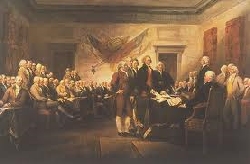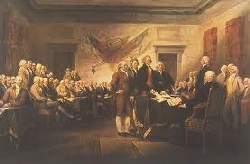 Last week I asked my readers to take a simple quiz regarding American government and history. I wanted to see just how well we knew some of the basics, such as our governing docs and some historical events. Nothing elaborate, I just wanted to take a pulse of our knowledge in general. 134 brave souls took the quiz for which I give my thanks. I didn't want the quiz to be complicated which is why I tried to keep it as simple as possible. I could have asked for such things as age and political party affiliation, but I didn't want to muddy the waters and turn people off.
Last week I asked my readers to take a simple quiz regarding American government and history. I wanted to see just how well we knew some of the basics, such as our governing docs and some historical events. Nothing elaborate, I just wanted to take a pulse of our knowledge in general. 134 brave souls took the quiz for which I give my thanks. I didn't want the quiz to be complicated which is why I tried to keep it as simple as possible. I could have asked for such things as age and political party affiliation, but I didn't want to muddy the waters and turn people off.
Out of those who took the test, probably 25 people got a perfect score. I was not surprised by this as I didn't try to invent a complicated quiz, just something that could give us some fundamental idea of what we know and what we don't.
The quiz was far from scientific, yet I believe I can draw some conclusions from it based on the input. But first, let's review the responses to each question. I'll show both the number of responses and the percentage of the total, followed by my comments.
PLEASE ANSWER ALL 10 QUESTIONS - AMERICAN CITIZENS ONLY
1. Signed in 1620, it is the first governing document of Plymouth Colony as written by the colonists, later known to history as the Pilgrims. It was in essence a social contract in which the settlers consented to follow the document's rules and regulations for the sake of survival.
22 - 17% - Magna Carta
92 - 69% - Mayflower Compact (CORRECT)
06 - 04% - Pilgrim Declaration
12 - 09% - Plymouth Compact
02 - 01% - Standish Consent and Decree
Comment: I considered this a tricky question as most people are unaware of any American history prior to 1776. I was pleasantly surprised to see how many people got it right. Those that answered "Magna Carta" disappointed me; even though it is an important document that influenced others, it was still developed in England, not America. I consider it significant that people recognized its name though. By the way, the last three, Pilgrim Declaration, Plymouth Compact, and Standish Consent and Degree were figments of my imagination.
2. How many "separate but equal" branches are there in the U.S. Federal Government?
000 - 00% - 1
002 - 01% - 2
131 - 98% - 3 (CORRECT)
001 - 01% - 4
000 - 00% - 50
Comment: People may have gotten other parts of the quiz wrong, but somehow the concept of "three separate but equal branches of government" representing the checks and balances of government has been successfully stamped into our brains. Only three people missed this.
3. What is the following quote from?
"We hold these truths to be self-evident, that all men are created equal, that they are endowed by their Creator with certain unalienable Rights, that among these are Life, Liberty and the pursuit of Happiness."
27 - 20% - Bill of Rights
94 - 70% - Declaration of Independence (CORRECT)
06 - 05% - Gettysburg Address
00 - 00% - Oath of Office
07 - 05% - US Constitution
Comment: The lion's share of answers went correctly to the Declaration of Independence, but I was surprised to see how many people picked the Bill of Rights. As an aside, many of us had to memorize this section of the Declaration in elementary school.
4. Which U.S. President was NOT impeached?
34 - 25% - Bill Clinton
20 - 15% - Andrew Johnson
80 - 60% - Richard Nixon (CORRECT)
Comment: I expected this kind of response to the question. Richard Nixon resigned before impeachment proceedings could begin. The other two were impeached, meaning to hold trial in the Senate, yet were found not guilty. No U.S. President has ever been forcibly removed from office through peaceful means (assassination is another matter altogether).
5. What is the following quote from?
"We the People of the United States, in Order to form a more perfect Union, establish Justice, insure domestic Tranquility, provide for the common defense, promote the general Welfare, and secure the Blessings of Liberty to ourselves and our Posterity,..."
04 - 03% - Bill of Rights
32 - 24% - Declaration of Independence
02 - 01% - Gettysburg Address
00 - 00% - Oath of Office
96 - 72% - US Constitution (CORRECT)
Comment: Most people got this correct, but notice how many confused it for the Declaration of Independence. This particular quote is from the Preamble of the Constitution. Like the Declaration, many of us had to memorize this in grade school, but I don't think they do so anymore.
6. What U.S. President served as commander-in-chief during World War I?
11 - 08% - Calvin Coolidge
07 - 05% - Warren Harding
18 - 13% - Theodore Roosevelt
03 - 03% - William Howard Taft
95 - 71% - Woodrow Wilson (CORRECT)
Comment: I expected this question to be a little tougher as a lot of us have forgotten the events of nearly 100 years ago. Baby boomers may still be familiar with World War II, but I thought they would surely have problems with the first war, "The War to end all Wars." I wasn't surprised that Teddy Roosevelt captured the number of responses that he did simply because of his strong name recognition. By the way, William Howard Taft was the only President who also became Chief Justice of the U.S. Supreme Court (and the first to throw out a baseball on opening day).
7. What is the following quote from?
"...and will to the best of my Ability, preserve, protect and defend the Constitution of the United States."
001 - 01% - Bill of Rights
000 - 00% - Declaration of Independence
000 - 00% - Gettysburg Address
127 - 95% - Oath of Office (CORRECT)
006 - 04% - US Constitution
Comment: I was flabbergasted that anyone got this wrong. The six who answered "US Constitution" should have read the question more carefully.
8. What is the following quote from?
"...that we here highly resolve that these dead shall not have died in vain - that this nation, under God, shall have a new birth of freedom - and that government of the people, by the people, for the people, shall not perish from the earth."
005 - 04% - Bill of Rights
002 - 01% - Declaration of Independence
122 - 91% - Gettysburg Address (CORRECT)
000 - 00% - Oath of Office
005 - 04% - US Constitution
Comment: I was pleased to see most people remembered Lincoln's speech. Interestingly, Lincoln was not the keynote speaker that day and, because of this, his words were almost overlooked by reporters in attendance. Thank God somebody was paying attention.
9. It stated that further efforts by European countries to colonize land or interfere with states in the Americas would be viewed as acts of aggression requiring U.S. intervention. It asserted that the Western Hemisphere was not to be further colonized by European countries but that the United States would neither interfere with existing European colonies nor meddle in the internal concerns of European countries.
009 - 07% - Emancipation Proclamation
002 - 01% - Kansas-Nebraska Act
000 - 00% - Kennedy Doctrine
116 - 87% - Monroe Doctrine (CORRECT)
007 - 05% - NATO Accord
Comment: I was pleasantly surprised by this one as I had assumed many people had forgotten about the Monroe doctrine, an important document which, to this day, is still in effect. I wonder if those who answered "Emancipation Proclamation" really understood the significance of that document. Probably not.
10. Which U.S. President was NOT directly involved with the Vietnam War?
81 - 60% - Dwight Eisenhower (CORRECT)
49 - 27% - Gerald Ford
01 - 01% - Lyndon Johnson
03 - 02% - John Kennedy
00 - 00% - Richard Nixon
Comment: This was perhaps my most controversial question as some of you argued that Eisenhower sent advisers to Viet Nam. True, but we send advisors to a lot of places. Viet Nam was Kennedy's "line in the sand" to stop the proliferation of Communism. As to Ford, he inherited the Paris Peace talks from Nixon following his resignation and was in charge when we finally pulled out in 1975. Interestingly, I find younger people have no clue about this war whatsoever.
Conclusion
A few things occurred to me as I was compiling the results. First, the Gettysburg Address is better known than the US Constitution and the Declaration of Independence. The Gettysburg Address is a moving speech but it certainly doesn't bear the significance of our governing documents.
Second, it seemed to me that a lot of people cannot distinguish between the Declaration of Independence and the US Constitution. They view them as synonymous documents. For what it's worth, the Declaration was used to sever Britain's authority over its American colonies. The U.S. Constitution specifies how the government is to operate. The Bill of Rights is an attachment to the Constitution and specifies the basic rights of the citizens, specifically the first ten amendments. It was greatly influenced by such documents as the "Magna Carta." All three documents, the Declaration of Independence, the US Constitution, and the Bill of Rights, are important reads that all citizens should be familiar with, not just students in grade school.
Finally, here are the number of correct answers versus incorrect answers submitted on the quiz:
1034 - 77% - Correct Answers
0306 - 23% - Incorrect Answers
In most schools, a 77% would represent a "C" which is probably not as bad as we think. Actually, this number is probably higher than the national average as I like to believe my readers are smarter than most.
Keep the Faith!
Note: All trademarks both marked and unmarked belong to their respective companies.
 Tim Bryce is a writer and the Managing Director of M. Bryce & Associates (MBA) of Palm Harbor, Florida and has over 30 years of experience in the management consulting field. He can be reached at timb001@phmainstreet.com
Tim Bryce is a writer and the Managing Director of M. Bryce & Associates (MBA) of Palm Harbor, Florida and has over 30 years of experience in the management consulting field. He can be reached at timb001@phmainstreet.com
For Tim's columns, see:
http://www.phmainstreet.com/timbryce.htm
Like the article? TELL A FRIEND.
Tune into Tim's THE BRYCE IS RIGHT! podcast Mondays-Fridays, 11:30am (Eastern).
Copyright © 2011 by Tim Bryce. All rights reserved.
 My wife and I went out for dinner the other night with our doctor and his wife. Actually, there was nothing unusual about this as we have known them for 25 years as good friends and neighbors. He practices Internal Medicine and I have always known him to be sincere about his work. I've met a lot of physicians over the years, several of whom are out for a quick buck, so it is refreshing to talk to one who is dedicated and takes his work seriously. Knowing of my background in systems and Information Technology he began to tell me about some recent changes in his practice that are affecting the very nature of his work. Frankly, I was disturbed with what I heard.
My wife and I went out for dinner the other night with our doctor and his wife. Actually, there was nothing unusual about this as we have known them for 25 years as good friends and neighbors. He practices Internal Medicine and I have always known him to be sincere about his work. I've met a lot of physicians over the years, several of whom are out for a quick buck, so it is refreshing to talk to one who is dedicated and takes his work seriously. Knowing of my background in systems and Information Technology he began to tell me about some recent changes in his practice that are affecting the very nature of his work. Frankly, I was disturbed with what I heard. Tim Bryce is a writer and the Managing Director of M. Bryce & Associates (MBA) of Palm Harbor, Florida and has over 30 years of experience in the management consulting field. He can be reached at timb001@phmainstreet.com
Tim Bryce is a writer and the Managing Director of M. Bryce & Associates (MBA) of Palm Harbor, Florida and has over 30 years of experience in the management consulting field. He can be reached at timb001@phmainstreet.com This weekend marks the thirtieth wedding anniversary for my wife and I, which many consider quite a milestone, particularly in an age where 40-50% of first time marriages end in divorce. We've already had a lot of people congratulate my wife and myself on this achievement as if we had just swum across the English Channel. Frankly though, we don't understand what the hubbub is all about. After all, this is what we signed up for and we're in it for the long haul. As an aside, I tend to appreciate anniversaries more so than birthdays as I, at least, had something to say about getting married.
This weekend marks the thirtieth wedding anniversary for my wife and I, which many consider quite a milestone, particularly in an age where 40-50% of first time marriages end in divorce. We've already had a lot of people congratulate my wife and myself on this achievement as if we had just swum across the English Channel. Frankly though, we don't understand what the hubbub is all about. After all, this is what we signed up for and we're in it for the long haul. As an aside, I tend to appreciate anniversaries more so than birthdays as I, at least, had something to say about getting married. I recently attended a training session for a nonprofit organization whereby the intention was to teach new members the policies and procedures for the organization. I was there to assist. During the course of the program, the instructor explained the protocol for conducting meetings where the public may be in attendance. In addition to "Roberts Rules of Order," the group had supplemental procedures for recognizing and answering questions from the floor. All of it seemed rather simple and straightforward, but there were a couple of young people in attendance, whom I judged to be in their mid-20's, who seemed to be baffled by the instructor's explanation. The teacher patiently repeated the procedure and demonstrated with some examples. This didn't seem to help as the students were still at a loss as to what the instructor was saying. At this point, other students chimed in to support the teacher and tried to explain the concept to them. I even threw in my two cents. After much cajoling, they finally acquiesced and claimed they understood, but I wasn't convinced they did.
I recently attended a training session for a nonprofit organization whereby the intention was to teach new members the policies and procedures for the organization. I was there to assist. During the course of the program, the instructor explained the protocol for conducting meetings where the public may be in attendance. In addition to "Roberts Rules of Order," the group had supplemental procedures for recognizing and answering questions from the floor. All of it seemed rather simple and straightforward, but there were a couple of young people in attendance, whom I judged to be in their mid-20's, who seemed to be baffled by the instructor's explanation. The teacher patiently repeated the procedure and demonstrated with some examples. This didn't seem to help as the students were still at a loss as to what the instructor was saying. At this point, other students chimed in to support the teacher and tried to explain the concept to them. I even threw in my two cents. After much cajoling, they finally acquiesced and claimed they understood, but I wasn't convinced they did. We don't play a game of cards much anymore, games like Bridge, Pinochle, Euchre, Gin Rummy, Hearts, Whist, even "Uno." Today you mostly see Poker, Blackjack, and Solitaire (on our computers), but that's about all. Finding someone who knows how to play the other games is few and far between. The playing of cards goes back centuries, but I find its passing into history an interesting sign of our changing times.
We don't play a game of cards much anymore, games like Bridge, Pinochle, Euchre, Gin Rummy, Hearts, Whist, even "Uno." Today you mostly see Poker, Blackjack, and Solitaire (on our computers), but that's about all. Finding someone who knows how to play the other games is few and far between. The playing of cards goes back centuries, but I find its passing into history an interesting sign of our changing times. I don't wear a wristwatch anymore and, frankly, don't really miss it. I never really liked wearing one and now consider it more of a status symbol as opposed to something practical for me to wear. When I need to know the time, I can get it from a number of places, such as my computer, cell phone, or in the car. I still manage to make appointments and am considered rather punctual. Other than a scheduled meeting, I am not very cognizant of time during the day other than knowing it is either morning, afternoon or evening. I tend to be more consumed with what I am working on as opposed to watching the clock which I think runs contrary to a lot of people today.
I don't wear a wristwatch anymore and, frankly, don't really miss it. I never really liked wearing one and now consider it more of a status symbol as opposed to something practical for me to wear. When I need to know the time, I can get it from a number of places, such as my computer, cell phone, or in the car. I still manage to make appointments and am considered rather punctual. Other than a scheduled meeting, I am not very cognizant of time during the day other than knowing it is either morning, afternoon or evening. I tend to be more consumed with what I am working on as opposed to watching the clock which I think runs contrary to a lot of people today. When I was a freshman in High School, I thought the seniors were so wise and cool, particularly those on the football team which I played on. Maybe it was nothing more than the facial hair that gave them the illusion of maturity. More likely though, I think it was their sense of confidence and skills that impressed me. Nonetheless, I couldn't wait to become a senior where I would be empowered with their wisdom. A few years later, when I finally became one, I discovered there was no magical metamorphosis imbuing me with special knowledge, yet I noticed the freshmen were now looking at me oddly in the same way I had done when I was their age. The same was true in college and, as I was to discover, throughout my life. We're all simply dancing as fast as we can and hoping we make the right decisions along the way.
When I was a freshman in High School, I thought the seniors were so wise and cool, particularly those on the football team which I played on. Maybe it was nothing more than the facial hair that gave them the illusion of maturity. More likely though, I think it was their sense of confidence and skills that impressed me. Nonetheless, I couldn't wait to become a senior where I would be empowered with their wisdom. A few years later, when I finally became one, I discovered there was no magical metamorphosis imbuing me with special knowledge, yet I noticed the freshmen were now looking at me oddly in the same way I had done when I was their age. The same was true in college and, as I was to discover, throughout my life. We're all simply dancing as fast as we can and hoping we make the right decisions along the way. Last week I asked my readers to take a simple quiz regarding American government and history. I wanted to see just how well we knew some of the basics, such as our governing docs and some historical events. Nothing elaborate, I just wanted to take a pulse of our knowledge in general. 134 brave souls took the quiz for which I give my thanks. I didn't want the quiz to be complicated which is why I tried to keep it as simple as possible. I could have asked for such things as age and political party affiliation, but I didn't want to muddy the waters and turn people off.
Last week I asked my readers to take a simple quiz regarding American government and history. I wanted to see just how well we knew some of the basics, such as our governing docs and some historical events. Nothing elaborate, I just wanted to take a pulse of our knowledge in general. 134 brave souls took the quiz for which I give my thanks. I didn't want the quiz to be complicated which is why I tried to keep it as simple as possible. I could have asked for such things as age and political party affiliation, but I didn't want to muddy the waters and turn people off. Whenever I'm asked to discuss the subject of Information Systems in the corporate world, I am inevitably asked, "Where does the programmer fit in?" I think this is an odd question as I see programming as only a small part of the overall puzzle. People are startled when I mention this, particularly programmers, who tend to see themselves as the center of the systems universe. I counter by asking, "What exactly does a programmer do?" After much discussion, we end up with the same answer, "a programmer takes human understandable specifications and converts it to a machine executable program, either by writing and compiling source code or through some interpreter capable of generating the program." This, in turn, leads to an interesting discussion as to what is meant by "requirements" (it seems everyone has their own spin on this). More importantly, it leads to a discussion as to what exactly a system is.
Whenever I'm asked to discuss the subject of Information Systems in the corporate world, I am inevitably asked, "Where does the programmer fit in?" I think this is an odd question as I see programming as only a small part of the overall puzzle. People are startled when I mention this, particularly programmers, who tend to see themselves as the center of the systems universe. I counter by asking, "What exactly does a programmer do?" After much discussion, we end up with the same answer, "a programmer takes human understandable specifications and converts it to a machine executable program, either by writing and compiling source code or through some interpreter capable of generating the program." This, in turn, leads to an interesting discussion as to what is meant by "requirements" (it seems everyone has their own spin on this). More importantly, it leads to a discussion as to what exactly a system is. In business, in order to keep people busy, "make-work" projects are devised to keep workers busy until they are needed for serious endeavors. Such projects were commonplace in Franklin Roosevelt's "New Deal" of the 1930's to try and get the country back to work. We are also witnessing it as part of the Obama administration's stimulus program. Here in Florida, the most visible example is the proposed high speed rail project (aka, "Bullet Train") to go between downtown Tampa and the Orlando airport. Over time, it is envisioned it would also connect Orlando with Miami, but for now, Tampa-to-Orlando is the first step.
In business, in order to keep people busy, "make-work" projects are devised to keep workers busy until they are needed for serious endeavors. Such projects were commonplace in Franklin Roosevelt's "New Deal" of the 1930's to try and get the country back to work. We are also witnessing it as part of the Obama administration's stimulus program. Here in Florida, the most visible example is the proposed high speed rail project (aka, "Bullet Train") to go between downtown Tampa and the Orlando airport. Over time, it is envisioned it would also connect Orlando with Miami, but for now, Tampa-to-Orlando is the first step. I have found comedian Jay Leno's "Jay-walking" segments entertaining particularly when he asks simple questions pertaining to the United States. The ignorance regarding how our government is organized and its history is brutally embarrassing. So much so, I wanted to find out for myself just how smart the American public really is when it comes to our history and government. Consequently, I devised the following little quiz to test your knowledge. Please take a moment to answer ten multiple choice questions.
I have found comedian Jay Leno's "Jay-walking" segments entertaining particularly when he asks simple questions pertaining to the United States. The ignorance regarding how our government is organized and its history is brutally embarrassing. So much so, I wanted to find out for myself just how smart the American public really is when it comes to our history and government. Consequently, I devised the following little quiz to test your knowledge. Please take a moment to answer ten multiple choice questions.  In last year's midterm elections, the Tea Party flexed its political muscles and changed the face of the U.S. House of Representatives and almost pulled off a stunning upset in the Senate to boot. Now that the 112th Congress has been seated, people are beginning to believe the work of the Tea Partiers is over and they will now go quietly away. Both President Obama and Senate majority leader Harry Reid (D-NV) have made statements suggesting the Tea Party is passé. For example, Reid was recently quoted as saying, "The tea party was born because of the economy... The tea party will disappear as soon as the economy gets better. And the economy's getting better all the time."
In last year's midterm elections, the Tea Party flexed its political muscles and changed the face of the U.S. House of Representatives and almost pulled off a stunning upset in the Senate to boot. Now that the 112th Congress has been seated, people are beginning to believe the work of the Tea Partiers is over and they will now go quietly away. Both President Obama and Senate majority leader Harry Reid (D-NV) have made statements suggesting the Tea Party is passé. For example, Reid was recently quoted as saying, "The tea party was born because of the economy... The tea party will disappear as soon as the economy gets better. And the economy's getting better all the time."